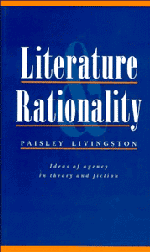1 - Rationality: some basic issues
from I - THEORIES AND QUESTIONS
Published online by Cambridge University Press: 16 October 2009
Summary
In this opening chapter I delineate a number of issues related to concepts of rationality and irrationality, and identify some of the assumptions and questions that are carried forward into the rest of this study. My goal is to formulate the issues as explicitly as possible in an effort to clarify the lines of enquiry that could potentially be taken up in analyses of literary phenomena. The question of the relevance of the issues surveyed in this chapter to literature will remain open until chapter 2. I hope that it is clear that my goal in the present work is not to provide a detailed treatment of all of the issues broached in this initial survey of topics.
A very basic background assumption that subtends the full range of particular theories of human rationality and irrationality holds that an important subset of human behaviour may be accurately characterized as purposeful action. In other words, it would be pointless to raise the issue of rationality in relation to any entity or events deemed to be devoid of intentionality and purposiveness. Thus, anyone who lends credence to some notion of human rationality may be expected to think that the latter two notions may rightly be applied to human beings, and anyone who does not lend any credence to intentional attitudes, or who thinks they play no effective rôle in human life, can hardly deem the notion of rationality necessary.
Information
- Type
- Chapter
- Information
- Literature and RationalityIdeas of Agency in Theory and Fiction, pp. 15 - 47Publisher: Cambridge University PressPrint publication year: 1991
